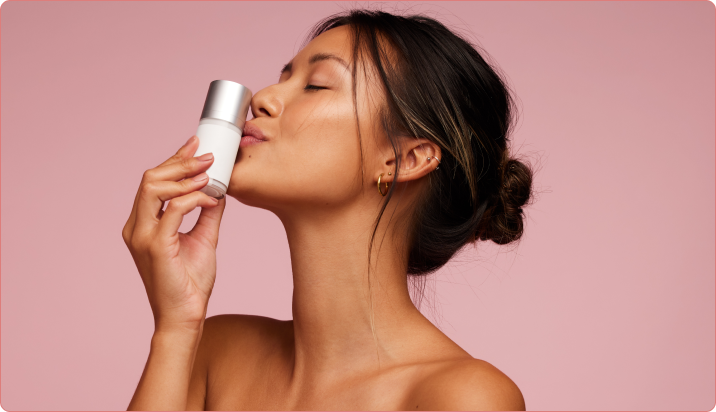We get it — it takes a while to figure out the exact mix of products that works for your skin. Been there. But what worked for you in the past might not work so well today. Those tried-and-true products you’ve been using might actually be the source of your current breakouts, blackheads, or temperamental oily-to-dry skin.
To help, we’ve asked our medical team for the top five signs that it’s time to switch up your skincare regime. The good news? A few small changes may be all it takes to get you back to healthy, glowing skin.
Top 5 signs you should switch up your skincare
1. Looking in the mirror and wanting something different

This one’s pretty simple: your personal skincare preferences can change! Year to year, or even season to season. A matte complexion might be the winter goal, with a dewy look for summer. If that’s what you’re aiming for, you’re going to need to swap out products. Keep in mind that changes to your regime could need anywhere from 6 – 12 weeks to really take effect, so be patient with anything new. Skincare is a marathon, not a sprint.
2. Experiencing unexpected breakouts

Waking up to see a constellation of new pimples is rough — especially when it’s out of character for your skin. Acne has a wide range of severity and can pop up at anytime.
For adults, it’s far more common for women, and is usually tied to hormonal changes. Hormonal acne can be treated by custom or generic medications, often requiring a medical professional to do a consult before prescribing (psst, Jill Health can help with that).
If you’ve noticed little white bumps on your skin, those are called milia. They usually pop up around the eyes, nose, cheeks and chin. They’re caused by tiny flakes of skin getting trapped and grown over, often by an excess of keratin (a cellular component of fine body hair). Often they’re an indication that you should change how you’re exfoliating. The best way to get rid of them is usually a retinol.
Whiteheads and blackheads can be caused by a few things: usually it’s not enough exfoliation, or blocked pores. Or, if you’re using chemical exfoliants like retinoids or hydroxy acids (even vitamin C serums!), it might be causing a skin “purge” to happen, where microcomedones rise to the surface and cause blemishes.
3. Your skin is too oily or dry

You know when your skin decides to go from dewy to oil slick? Or combination to dry-as-the-Sahara? Yeah, those wild changes mean something’s up.
If you’re getting too oily, drying products can actually be the culprit. If your skin is being stripped of too much of its natural moisture, your glands start overproducing oil to compensate. This can happen if you’re using too many products that dry you out.
If your skin could win a contest with Burning Man for being baked, this dryness could be because of the seasons changing and a reduction of air humidity. Or it could be from an issue in your regime. If you’re getting flaky skin that makes it tough to use makeup, you’re probably using something overly drying. In this case, you should load up on deeply moisturizing creams and avoid products that use alcohols, peroxides, intense acids, or retinoids.
4. Discolouration or pigment changes

If you’re finding your skin has red patches or you’re noticing a change in your melanin (light or dark colouration), it’s time to pause and re-evaluate your regime. It may be a good idea to talk to a doctor as well, to rule out any possible medical issues (we offer free consults btw — click here).
Hot water, irritating or overly abrasive products, UV exposure, and hormones all can have a big effect on discolouration or pigment changes in your skin. What can help is using SPF daily — even on cloudy days! UV rays are tough, they pierce through just about any cloud cover. Be sure to follow the reapplication instructions: it’s usually every two to three hours.
5. Sudden pain or irritation

If your skin hurts or is very irritated, then something has to change, fast.
Usually this is because the protective barrier in your skin is being eroded. This can be caused by chemicals, UV rays, and swings in temperature. To get to this state, it’s likely that a product you’re using regularly is no longer working. Review what you have in your skincare lineup and remove any exfoliants and acids (sometimes termed AHAs, BHAs, or PHAs).
Use of hot water and overly dry climates (time to move to the tropics!) can also cause major irritation. Note that some medications may have skin irritation listed as a side effect — check for that in anything you use if this is happening to you. Generally speaking, with anything medicated, it’s always best to check with a professional before putting it in your regular routine.
What if I’m just super bored with my regime?

Not seeing these signs but just bored af with your current routine? Yeah, relatable. If you’re happy with how your skin looks though, it’s best to keep doing what you’re doing. While we may not always agree with our parents’ l’il nuggets of wisdom, the old ‘don’t fix what ain’t broke’ adage has some truth to it.
If you’re *really* itching for something new though, don’t worry: we do have some suggestions!
- Try a new tool, like a gua sha or exfoliating body gloves
- Try a new product! Just make sure to keep at it for a few weeks before deciding yea or nay; that’s how long it can take to see changes.
- Try our skincare quiz! It’ll build you an acne solution totally custom to you 👀
Healthy skin is such an important part of feeling your best – we can help you take care of it.





